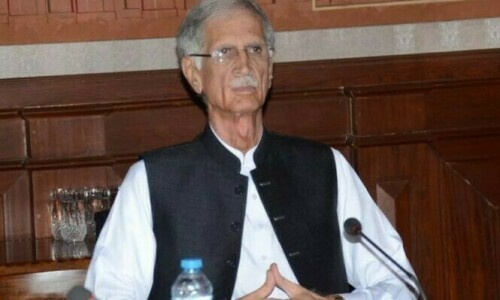WHAT exactly are our political parties fighting for in the upcoming general elections? What are their plans?
What promises are they willing to make to their constituents, the vast majority of whom are expecting significant improvement in their social and economic conditions post-Feb 8?
Less than three weeks from polling day, it is strange that we still do not know.
The front runners in the race — the PTI, the PML-N and the PPP — have largely avoided providing details about how they plan to conduct their governments. The PPP has, admittedly, issued a 10-point to-do list it has called a ‘manifesto’, but this can hardly be considered one given how lacking it is in details about how its ambitious promises are to be achieved.
Meanwhile, the PML-N has kept delaying the unveiling of its long-awaited manifesto, while the PTI made one abortive attempt before fresh challenges to its survival began consuming all its energies.
It cannot be argued that the parties haven’t had enough time to prepare. For starters, elections are being held around three months after they became due under the constitutional timeline. This means the parties got three additional months to work on their action plans.
Not only that, Pakistan’s economic troubles have been thoroughly dissected over the past year and a half, meaning each party’s policy tsars had more than enough time and material to come up with their proposals on how best to address them.
Lastly, considering how hard the entire state apparatus has been pushing for a political reset, one would have assumed that the parties being positioned to fill the vacuum — left after the PTI’s relegation to ‘non grata’ status — would have had some new ideas with which to rally public support to their side. Clearly, nobody seems to have taken much interest in doing their homework.
It seems that the parties are greatly underestimating the burden they will receive if they come to power. Considering the plethora of challenges being faced by the country, navigating the troubled waters Pakistan is in will not be an easy task.
Whichever party goes on to form the next government will face steep challenges during a period of painful social and economic adjustment.
In this context, it would have been helpful for voters, observers and commentators to have reference to some document against which they could judge each party’s suitability to govern at such a critical juncture in the country’s history.
Unfortunately, the bigger parties have chosen the ad hoc approach: get power first, decide what to do with it later. They ought to take a lesson from the Jamaat-i-Islami, which, despite its very modest prospects, seems to have expended considerable thought and effort on delineating what it can achieve if given executive power.
Published in Dawn, January 20th, 2024













































Dear visitor, the comments section is undergoing an overhaul and will return soon.